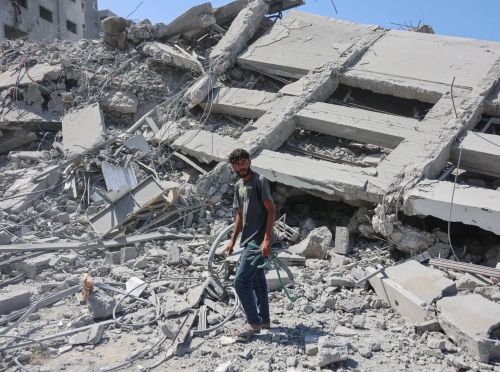

Israel has demonstrated both capability and willingness to act unilaterally, regardless of geography. Its enemies will respond, perhaps asymmetrically, perhaps unpredictably.

By Matthew A. McIntosh
Public Historian
Brewminate
A Region Ignited
In the span of three days, Israel launched military strikes in six different countries. Reports confirm operations in Lebanon, Syria, Iraq, Yemen, and even targets inside Iran, alongside strikes in Palestinian territories. The scale is staggering, not simply because of geography but because of what it signals: Israel has chosen to expand its battlefield across borders that once served as fragile buffers.
The official narrative frames the strikes as preemptive, aimed at neutralizing threats from Hezbollah, Iranian militias, and other groups seen as proxies of Tehran. Yet the sheer breadth of the campaign raises questions about intent. Was this defensive necessity, or was it a demonstration that Israel’s reach is no longer constrained by conventional limits?
Lebanon and Syria: The Familiar Frontlines
Lebanon and Syria bore the brunt of the initial attacks. In Beirut’s southern suburbs, long considered a Hezbollah stronghold, explosions rattled buildings and sent families scrambling into the streets. The strikes were precise but unmistakably disruptive, tearing through neighborhoods already shaped by decades of conflict.
In Syria, Israeli jets targeted weapons depots and air defense batteries near Damascus. These raids are not new — Israel has carried out hundreds in recent years to disrupt Iranian supply lines — but the intensity over this 72-hour window felt different. Multiple strikes in a short span conveyed urgency, perhaps even desperation, to keep Iranian influence at bay.
Iraq and Yemen: Expanding the Battleground
If Lebanon and Syria are familiar fronts, Iraq and Yemen represent a dangerous expansion. In Iraq, Israeli drones reportedly struck facilities linked to pro-Iranian militias. The attacks occurred not far from civilian infrastructure, reigniting debates inside Baghdad about sovereignty and the risks of being caught in someone else’s war.
In Yemen, Israeli missiles targeted Houthi positions said to be preparing drone launches toward the Red Sea. Yemenis already endure one of the world’s worst humanitarian crises, and the notion that another foreign military is inserting itself only deepens despair. For many, the strikes confirm that their country has become a proving ground for regional rivalries rather than a land with its own future.
Iran: The Message Sent Directly
Perhaps the most consequential attacks were those aimed at Iran itself. Explosions near Isfahan rattled nerves far beyond the region. Israel has long hinted that it would strike directly if Iran crossed certain thresholds in its nuclear program. By hitting targets inside Iranian territory, Israel has now made good on that threat, even if officials deny involvement outright.
For Tehran, the message is unmistakable. Its proxies are not the only ones vulnerable. Its homeland is, too. And for Washington, caught between supporting an ally and managing escalation, the question is no longer hypothetical. How far can this cycle go before the region tips into a war no one can contain?
Gaza and the Palestinian Question
Amid this flurry of regional strikes, Israel also continued bombardments in Gaza. Entire neighborhoods already scarred by blockade and displacement endured new waves of fire. For Palestinians, the message feels cruelly consistent: while the world’s attention shifts to regional theaters, Gaza remains a perpetual target.
Here the rhetoric of defense sounds particularly hollow. Airstrikes destroy homes as much as weapons caches. The rhythm of life is one of ruins and rebuilding, each new wave of violence undoing what little progress was made between bombardments. It is difficult to see these attacks as separate from the broader regional campaign. Rather, they fold into a narrative where force is the first, and often the only, instrument of policy.
The Broader Implications
What makes this escalation so alarming is not only the number of countries involved but the precedent it sets. Six nations struck in 72 hours suggests that Israel no longer recognizes boundaries in its pursuit of security. Its military has always operated with reach, but never with such open disregard for international lines.
Regional powers are watching closely. Saudi Arabia, still balancing negotiations with both Washington and Tehran, now faces the prospect of being pulled into the conflict. Egypt, long a broker between Israel and Gaza, fears spillover that could destabilize Sinai. Even Turkey, already entangled in Syria, has warned that unchecked escalation will unravel what little stability remains in the region.
And then there is the question of law. International norms are frayed, but they are not meaningless. Striking six countries in three days stretches the principle of self-defense beyond recognition. The risk is that what begins as precedent for Israel may soon be precedent for others.
A Region at the Brink
The Middle East is no stranger to fire, but that 72 hours feel like a new threshold. Israel has demonstrated both capability and willingness to act unilaterally, regardless of geography. Its enemies will respond, perhaps asymmetrically, perhaps unpredictably. The result could be a spiral that drags the region into wider war.
For civilians from Beirut to Sana’a, from Damascus to Gaza City, the politics of justification matter little. What matters are the sirens, the explosions, the funerals, the endless cycles of fear. For them, the question is not about deterrence or strategy but about survival.
And for the world beyond, the strikes demand attention. They force uncomfortable reckonings about what security means, about how far a state can go in defending itself before it becomes the very aggressor it claims to resist. The last three days have redrawn maps not only in military terms but in the moral imagination.
Originally published by Brewminate, 09.18.2025, under the terms of a Creative Commons Attribution-NonCommercial-NoDerivatives 4.0 International license.


